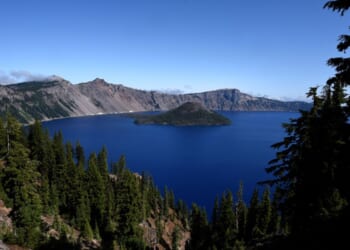One of America’s premier national parks is warning visitors that it gets cold way up on Mount Rainier, noting that travelers are not always prepared for what they find.
“Several incidents in March demonstrate the potential hazards of high-elevation activities and the complexity of search and rescue operations in the park,” a news release on the park’s website admonished potential visitors.
“Rescue is not guaranteed,” the release said.
Mount Rainier rises to 14,410 feet above sea level, the park website said.
But a release warning tourists to prepare for a visit noted that even at lower elevations in the park, winter conditions do not disappear when the calendar says it is spring
“Longer days and rising temperatures can be misleading when planning a trip to higher elevations. The park’s popular Paradise area, for example, sits at an elevation of 5,400 feet and maintains its snow cover until early summer. Trails there are typically covered with snow and ice into June,” the release warned.
Cars are required to carry snow chains for traction through May 1.
Campers are warned to bring “proper equipment for avalanche conditions, gear to spend an unexpected night out, and a good plan that you’ve shared with others.”
The release noted that in March alone, several visitors had required emergency assistance.
Have you ever visited Rainier?
On March 8, a 30-year-old woman was injured while skiing near Panorama Point, which is about 6,000 feet above sea level. She was brought out in a litter after two rangers and four volunteers from the Mount Rainier Nordic Patrol hiked in to rescue her.
That same day, a 62-year-old man was snowshoeing on the Muir Snowfield, roughly 9,600 feet in elevation, when he was injured. The release said that despite freezing temperatures and 60 mph winds, two rangers rescued him.
Park emergency medical technicians met rescuers at about 3 a.m. March 9 and took the man to a medical facility. Stretching resources to accomplish these rescues led to the closure of the Longmire-Paradise Road the next day.
On March 15, rangers treated a 72-year-old man who was later cited for camping without a permit and a 19-year-old who needed to be brought out in a wheeled litter.
Even skilled climbers can be injured, as noted by KOMO-TV.
On Friday, a Search and Rescue team from Naval Air Station Whidbey Island helped rescue a member of the Army 1st Special Forces group who fell 100 feet near Pinnacle Peak, breaking his leg.
The rescue team hoisted the soldier aboard a helicopter and flew him to a hospital for treatment.
In March, Zuleika Witron, 28, fell into the Carbon River at Mount Rainier National Park after her dog slipped and fell in, according to ABC. The dog was found alive, but the former Army medic was found dead days after the incident, according to People.
Advertise with The Western Journal and reach millions of highly engaged readers, while supporting our work. Advertise Today.









